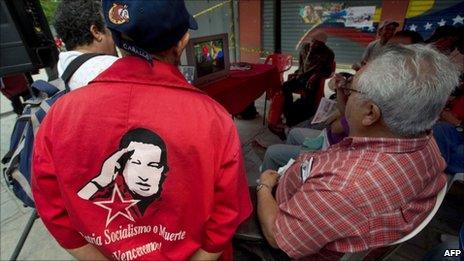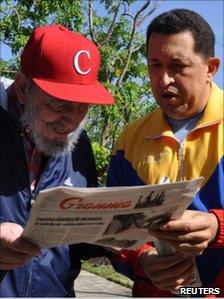Venezuela suspends summit over Hugo Chavez's illness
- Published

Venezuelans are eager for any news about President Chavez
Venezuela has suspended a regional summit scheduled for 5 July amid continuing speculation over the health of Venezuelan President Hugo Chavez.
Mr Chavez left the country on 8 June for Cuba, where he had surgery, apparently for a pelvic abscess.
On Tuesday Cuban state TV showed images of the president talking animatedly to former Cuban leader Fidel Castro.
But on Wednesday Venezuelan officials said the summit, which he was due to host, had been delayed.
Analysts say the suspension of the Community of Latin American and Caribbean States (CELAC) meeting will be a blow to President Chavez.
He was due to chair the first gathering of the new regional bloc on Margarita island, off the Venezuelan coast.
Venezuelan officials had earlier said the videos from Cuba proved that the president's recovery was continuing.
Extended footage of Mr Chavez and Mr Castro talking was broadcast by Cuban and Venezuelan TV on Wednesday.

Photographs and footage showed Mr Chavez apparently looking well
Vice-President Elias Jaua said Mr Chavez had been in close contact with officials in an effort to "continue driving the national plans forward".
Mr Chavez's unexpectedly long absence from the country has prompted debate on whether he should delegate executive power to the vice-president.
Venezuelan officials have said he underwent emergency surgery on 10 June for a pelvic abscess, but there has been speculation in the Venezuelan and foreign press that the president's condition could be more serious.
He had been widely expected to be back in time to host the CELAC summit which also coincides with Venezuela's bicentennial celebrations.
President Chavez is one of the driving forces behind CELAC, seen as an alternative to the Organization of American States (OAS). Unlike the OAS, CELAC excludes the US and Canada.
The BBC's Sarah Grainger in Caracas said President Chavez wants to see greater co-operation between Latin American nations and less US influence in the region.
- Published30 June 2011
- Published29 June 2011
- Published26 June 2011